London School of Commerce: Importance of the Foundation Year Essay
VerifiedAdded on 2023/03/21
|10
|2553
|100
Essay
AI Summary
This essay, written for a Study Skills for Higher Education module at the London School of Commerce, examines the critical role of the foundation year in the UK education system. It highlights how the foundation year, aimed at widening participation, provides an alternative route to university for underrepresented groups, including mature students, those from low-income backgrounds, and international students. The essay details the benefits, such as preparing students for university life, bridging academic gaps, and fostering social integration. It also addresses the challenges faced by foundation year students, including financial constraints, homesickness, and cultural adjustment, while emphasizing the development of essential study skills. The essay concludes by underscoring the significance of the foundation year in promoting educational equality and increasing access to higher education for a diverse student population.
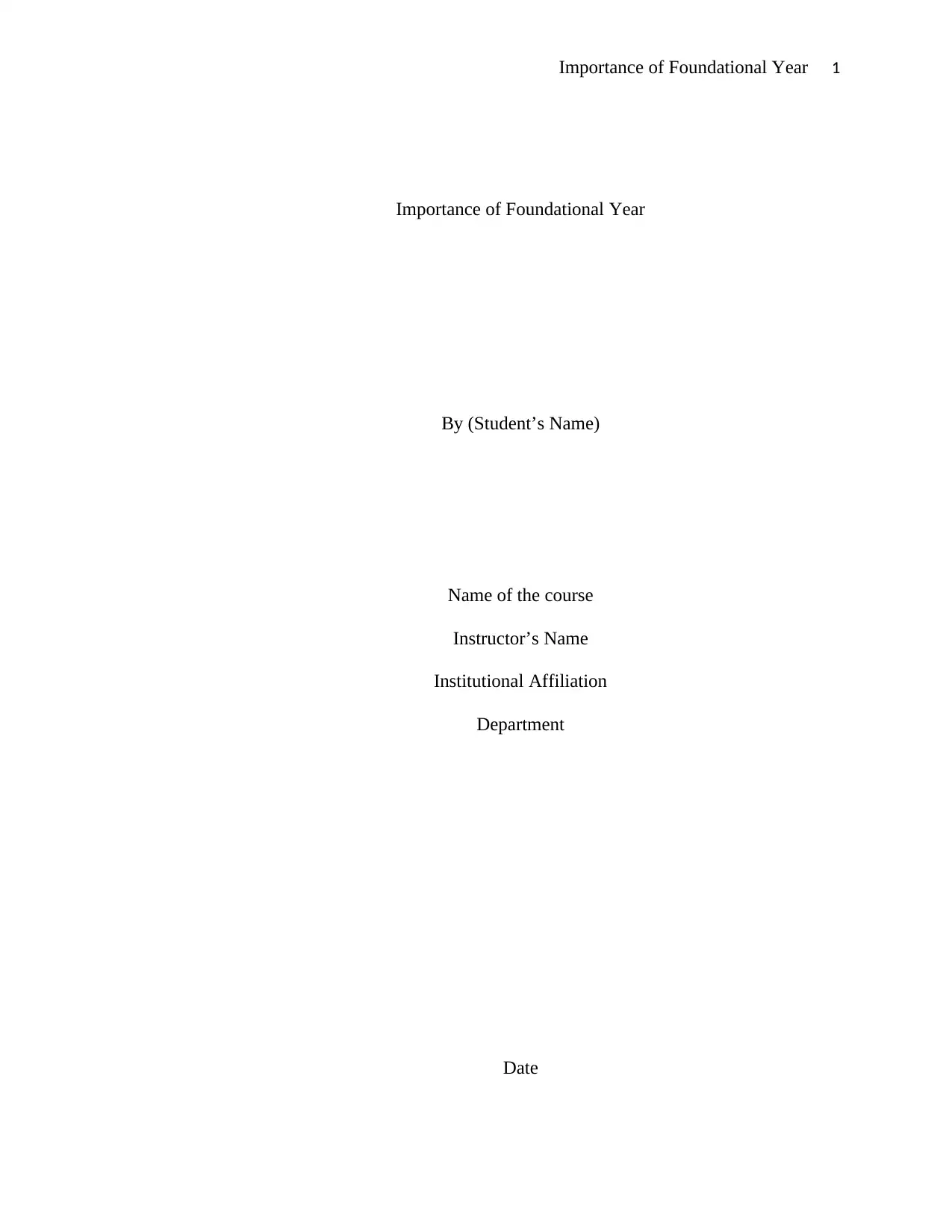
Importance of Foundational Year 1
Importance of Foundational Year
By (Student’s Name)
Name of the course
Instructor’s Name
Institutional Affiliation
Department
Date
Importance of Foundational Year
By (Student’s Name)
Name of the course
Instructor’s Name
Institutional Affiliation
Department
Date
Paraphrase This Document
Need a fresh take? Get an instant paraphrase of this document with our AI Paraphraser
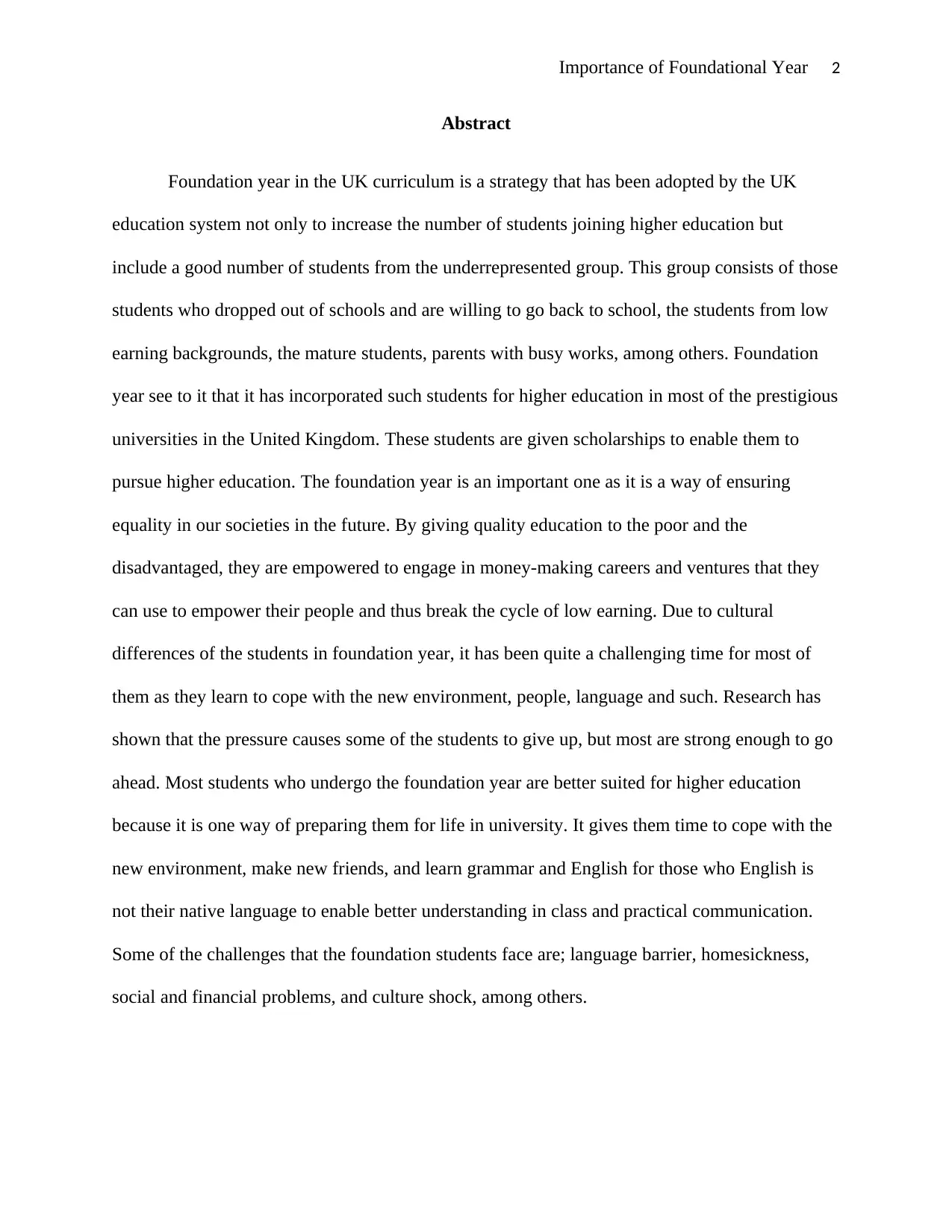
Importance of Foundational Year 2
Abstract
Foundation year in the UK curriculum is a strategy that has been adopted by the UK
education system not only to increase the number of students joining higher education but
include a good number of students from the underrepresented group. This group consists of those
students who dropped out of schools and are willing to go back to school, the students from low
earning backgrounds, the mature students, parents with busy works, among others. Foundation
year see to it that it has incorporated such students for higher education in most of the prestigious
universities in the United Kingdom. These students are given scholarships to enable them to
pursue higher education. The foundation year is an important one as it is a way of ensuring
equality in our societies in the future. By giving quality education to the poor and the
disadvantaged, they are empowered to engage in money-making careers and ventures that they
can use to empower their people and thus break the cycle of low earning. Due to cultural
differences of the students in foundation year, it has been quite a challenging time for most of
them as they learn to cope with the new environment, people, language and such. Research has
shown that the pressure causes some of the students to give up, but most are strong enough to go
ahead. Most students who undergo the foundation year are better suited for higher education
because it is one way of preparing them for life in university. It gives them time to cope with the
new environment, make new friends, and learn grammar and English for those who English is
not their native language to enable better understanding in class and practical communication.
Some of the challenges that the foundation students face are; language barrier, homesickness,
social and financial problems, and culture shock, among others.
Abstract
Foundation year in the UK curriculum is a strategy that has been adopted by the UK
education system not only to increase the number of students joining higher education but
include a good number of students from the underrepresented group. This group consists of those
students who dropped out of schools and are willing to go back to school, the students from low
earning backgrounds, the mature students, parents with busy works, among others. Foundation
year see to it that it has incorporated such students for higher education in most of the prestigious
universities in the United Kingdom. These students are given scholarships to enable them to
pursue higher education. The foundation year is an important one as it is a way of ensuring
equality in our societies in the future. By giving quality education to the poor and the
disadvantaged, they are empowered to engage in money-making careers and ventures that they
can use to empower their people and thus break the cycle of low earning. Due to cultural
differences of the students in foundation year, it has been quite a challenging time for most of
them as they learn to cope with the new environment, people, language and such. Research has
shown that the pressure causes some of the students to give up, but most are strong enough to go
ahead. Most students who undergo the foundation year are better suited for higher education
because it is one way of preparing them for life in university. It gives them time to cope with the
new environment, make new friends, and learn grammar and English for those who English is
not their native language to enable better understanding in class and practical communication.
Some of the challenges that the foundation students face are; language barrier, homesickness,
social and financial problems, and culture shock, among others.

Importance of Foundational Year 3
Contents
Abstract......................................................................................................................................................2
Introduction...............................................................................................................................................4
Importance of Foundational Year............................................................................................................4
References................................................................................................................................................10
Contents
Abstract......................................................................................................................................................2
Introduction...............................................................................................................................................4
Importance of Foundational Year............................................................................................................4
References................................................................................................................................................10
⊘ This is a preview!⊘
Do you want full access?
Subscribe today to unlock all pages.

Trusted by 1+ million students worldwide
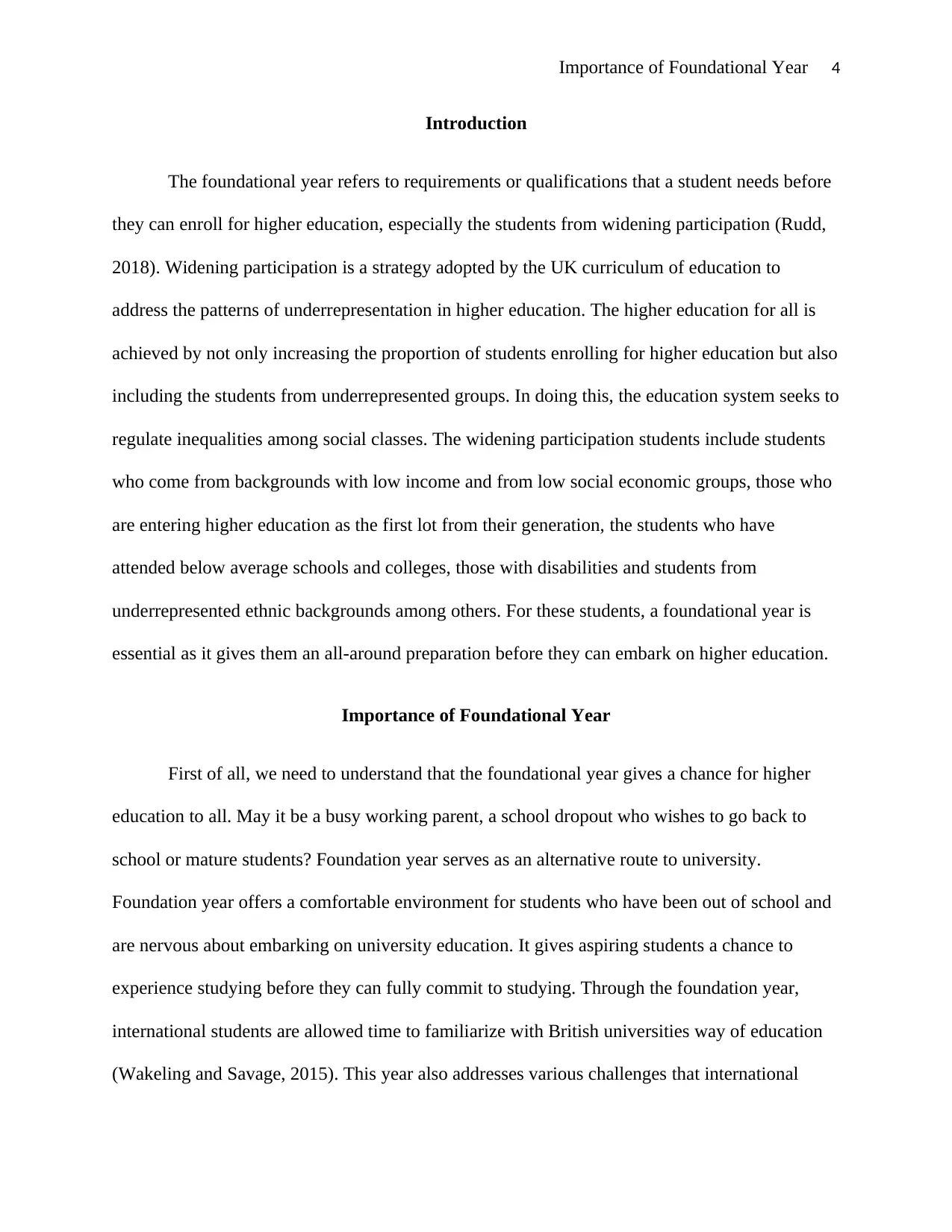
Importance of Foundational Year 4
Introduction
The foundational year refers to requirements or qualifications that a student needs before
they can enroll for higher education, especially the students from widening participation (Rudd,
2018). Widening participation is a strategy adopted by the UK curriculum of education to
address the patterns of underrepresentation in higher education. The higher education for all is
achieved by not only increasing the proportion of students enrolling for higher education but also
including the students from underrepresented groups. In doing this, the education system seeks to
regulate inequalities among social classes. The widening participation students include students
who come from backgrounds with low income and from low social economic groups, those who
are entering higher education as the first lot from their generation, the students who have
attended below average schools and colleges, those with disabilities and students from
underrepresented ethnic backgrounds among others. For these students, a foundational year is
essential as it gives them an all-around preparation before they can embark on higher education.
Importance of Foundational Year
First of all, we need to understand that the foundational year gives a chance for higher
education to all. May it be a busy working parent, a school dropout who wishes to go back to
school or mature students? Foundation year serves as an alternative route to university.
Foundation year offers a comfortable environment for students who have been out of school and
are nervous about embarking on university education. It gives aspiring students a chance to
experience studying before they can fully commit to studying. Through the foundation year,
international students are allowed time to familiarize with British universities way of education
(Wakeling and Savage, 2015). This year also addresses various challenges that international
Introduction
The foundational year refers to requirements or qualifications that a student needs before
they can enroll for higher education, especially the students from widening participation (Rudd,
2018). Widening participation is a strategy adopted by the UK curriculum of education to
address the patterns of underrepresentation in higher education. The higher education for all is
achieved by not only increasing the proportion of students enrolling for higher education but also
including the students from underrepresented groups. In doing this, the education system seeks to
regulate inequalities among social classes. The widening participation students include students
who come from backgrounds with low income and from low social economic groups, those who
are entering higher education as the first lot from their generation, the students who have
attended below average schools and colleges, those with disabilities and students from
underrepresented ethnic backgrounds among others. For these students, a foundational year is
essential as it gives them an all-around preparation before they can embark on higher education.
Importance of Foundational Year
First of all, we need to understand that the foundational year gives a chance for higher
education to all. May it be a busy working parent, a school dropout who wishes to go back to
school or mature students? Foundation year serves as an alternative route to university.
Foundation year offers a comfortable environment for students who have been out of school and
are nervous about embarking on university education. It gives aspiring students a chance to
experience studying before they can fully commit to studying. Through the foundation year,
international students are allowed time to familiarize with British universities way of education
(Wakeling and Savage, 2015). This year also addresses various challenges that international
Paraphrase This Document
Need a fresh take? Get an instant paraphrase of this document with our AI Paraphraser
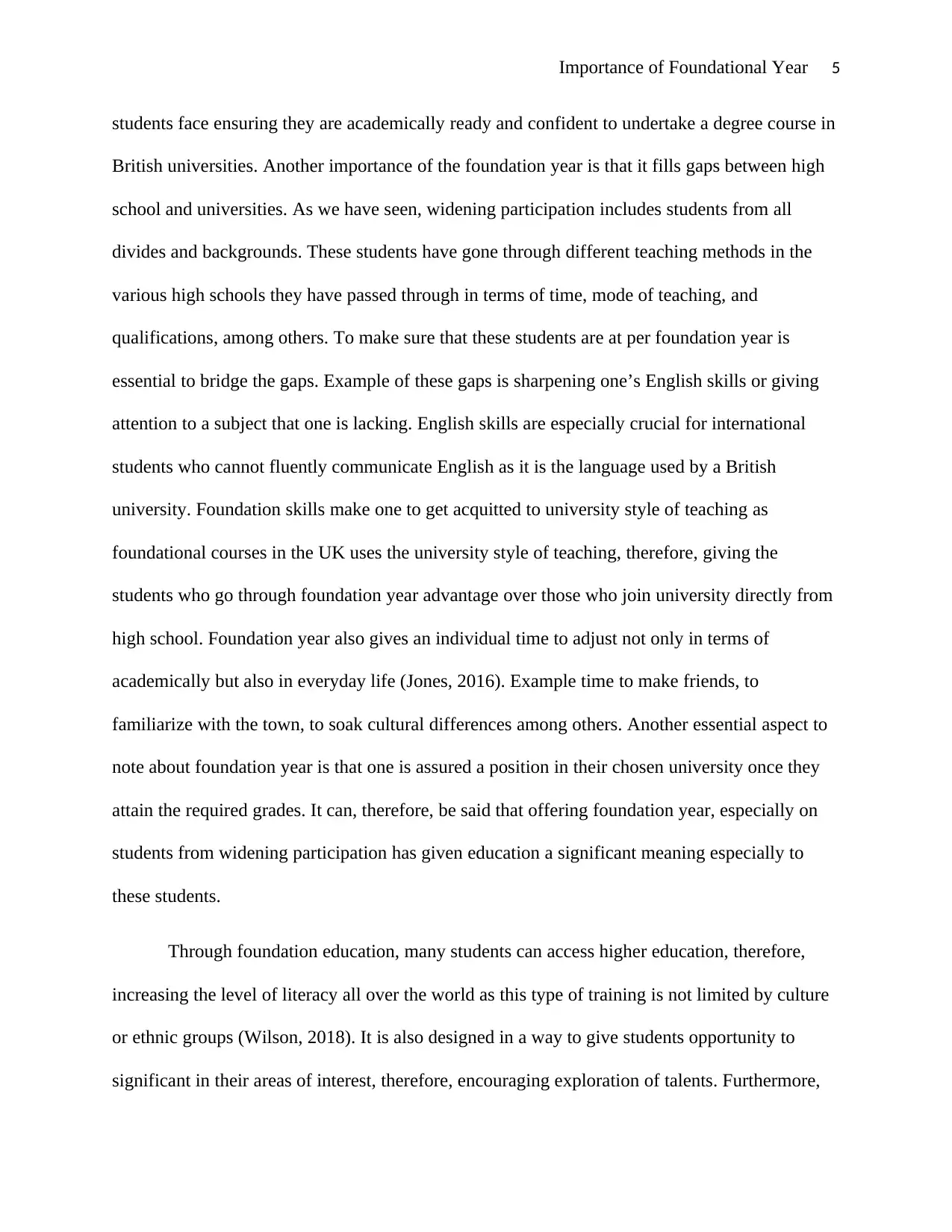
Importance of Foundational Year 5
students face ensuring they are academically ready and confident to undertake a degree course in
British universities. Another importance of the foundation year is that it fills gaps between high
school and universities. As we have seen, widening participation includes students from all
divides and backgrounds. These students have gone through different teaching methods in the
various high schools they have passed through in terms of time, mode of teaching, and
qualifications, among others. To make sure that these students are at per foundation year is
essential to bridge the gaps. Example of these gaps is sharpening one’s English skills or giving
attention to a subject that one is lacking. English skills are especially crucial for international
students who cannot fluently communicate English as it is the language used by a British
university. Foundation skills make one to get acquitted to university style of teaching as
foundational courses in the UK uses the university style of teaching, therefore, giving the
students who go through foundation year advantage over those who join university directly from
high school. Foundation year also gives an individual time to adjust not only in terms of
academically but also in everyday life (Jones, 2016). Example time to make friends, to
familiarize with the town, to soak cultural differences among others. Another essential aspect to
note about foundation year is that one is assured a position in their chosen university once they
attain the required grades. It can, therefore, be said that offering foundation year, especially on
students from widening participation has given education a significant meaning especially to
these students.
Through foundation education, many students can access higher education, therefore,
increasing the level of literacy all over the world as this type of training is not limited by culture
or ethnic groups (Wilson, 2018). It is also designed in a way to give students opportunity to
significant in their areas of interest, therefore, encouraging exploration of talents. Furthermore,
students face ensuring they are academically ready and confident to undertake a degree course in
British universities. Another importance of the foundation year is that it fills gaps between high
school and universities. As we have seen, widening participation includes students from all
divides and backgrounds. These students have gone through different teaching methods in the
various high schools they have passed through in terms of time, mode of teaching, and
qualifications, among others. To make sure that these students are at per foundation year is
essential to bridge the gaps. Example of these gaps is sharpening one’s English skills or giving
attention to a subject that one is lacking. English skills are especially crucial for international
students who cannot fluently communicate English as it is the language used by a British
university. Foundation skills make one to get acquitted to university style of teaching as
foundational courses in the UK uses the university style of teaching, therefore, giving the
students who go through foundation year advantage over those who join university directly from
high school. Foundation year also gives an individual time to adjust not only in terms of
academically but also in everyday life (Jones, 2016). Example time to make friends, to
familiarize with the town, to soak cultural differences among others. Another essential aspect to
note about foundation year is that one is assured a position in their chosen university once they
attain the required grades. It can, therefore, be said that offering foundation year, especially on
students from widening participation has given education a significant meaning especially to
these students.
Through foundation education, many students can access higher education, therefore,
increasing the level of literacy all over the world as this type of training is not limited by culture
or ethnic groups (Wilson, 2018). It is also designed in a way to give students opportunity to
significant in their areas of interest, therefore, encouraging exploration of talents. Furthermore,
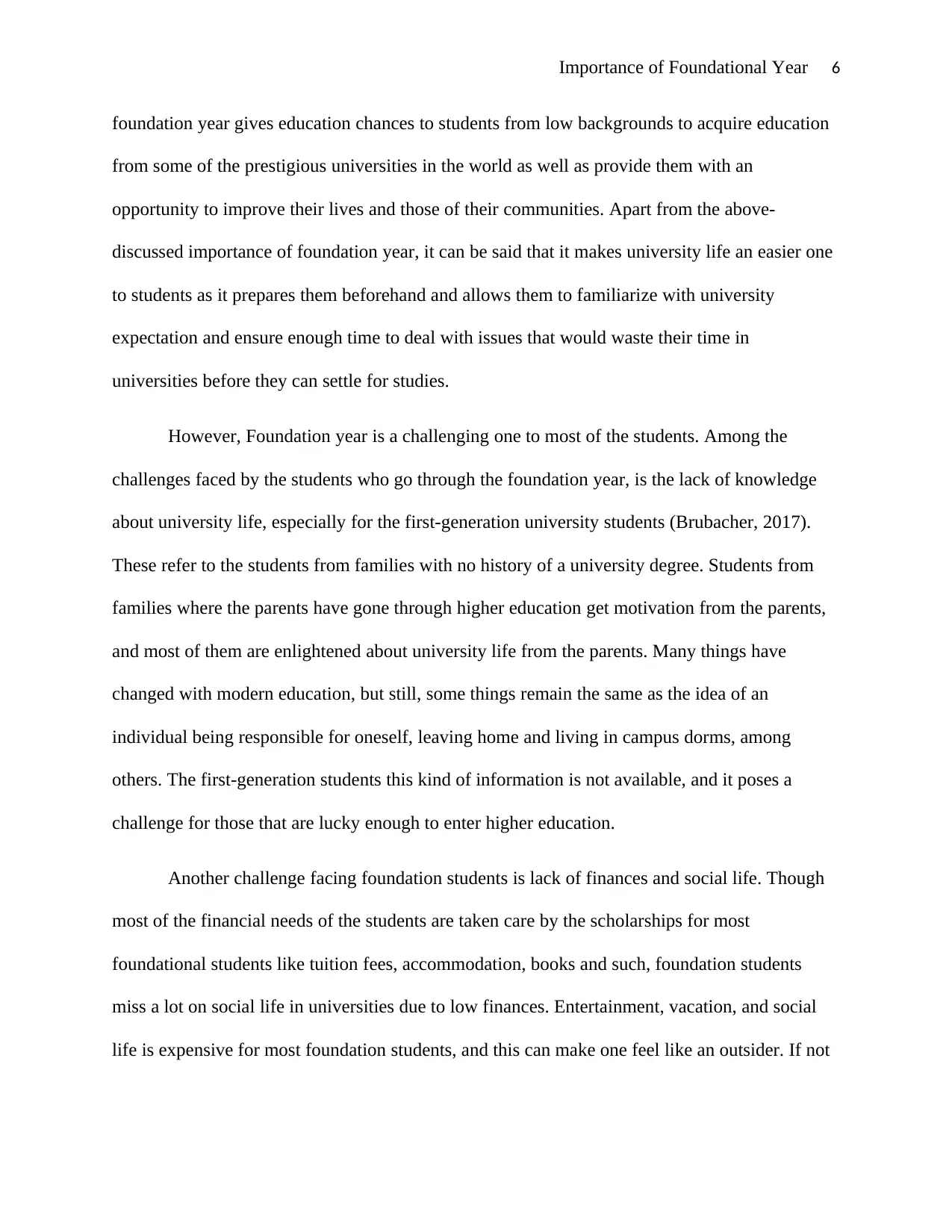
Importance of Foundational Year 6
foundation year gives education chances to students from low backgrounds to acquire education
from some of the prestigious universities in the world as well as provide them with an
opportunity to improve their lives and those of their communities. Apart from the above-
discussed importance of foundation year, it can be said that it makes university life an easier one
to students as it prepares them beforehand and allows them to familiarize with university
expectation and ensure enough time to deal with issues that would waste their time in
universities before they can settle for studies.
However, Foundation year is a challenging one to most of the students. Among the
challenges faced by the students who go through the foundation year, is the lack of knowledge
about university life, especially for the first-generation university students (Brubacher, 2017).
These refer to the students from families with no history of a university degree. Students from
families where the parents have gone through higher education get motivation from the parents,
and most of them are enlightened about university life from the parents. Many things have
changed with modern education, but still, some things remain the same as the idea of an
individual being responsible for oneself, leaving home and living in campus dorms, among
others. The first-generation students this kind of information is not available, and it poses a
challenge for those that are lucky enough to enter higher education.
Another challenge facing foundation students is lack of finances and social life. Though
most of the financial needs of the students are taken care by the scholarships for most
foundational students like tuition fees, accommodation, books and such, foundation students
miss a lot on social life in universities due to low finances. Entertainment, vacation, and social
life is expensive for most foundation students, and this can make one feel like an outsider. If not
foundation year gives education chances to students from low backgrounds to acquire education
from some of the prestigious universities in the world as well as provide them with an
opportunity to improve their lives and those of their communities. Apart from the above-
discussed importance of foundation year, it can be said that it makes university life an easier one
to students as it prepares them beforehand and allows them to familiarize with university
expectation and ensure enough time to deal with issues that would waste their time in
universities before they can settle for studies.
However, Foundation year is a challenging one to most of the students. Among the
challenges faced by the students who go through the foundation year, is the lack of knowledge
about university life, especially for the first-generation university students (Brubacher, 2017).
These refer to the students from families with no history of a university degree. Students from
families where the parents have gone through higher education get motivation from the parents,
and most of them are enlightened about university life from the parents. Many things have
changed with modern education, but still, some things remain the same as the idea of an
individual being responsible for oneself, leaving home and living in campus dorms, among
others. The first-generation students this kind of information is not available, and it poses a
challenge for those that are lucky enough to enter higher education.
Another challenge facing foundation students is lack of finances and social life. Though
most of the financial needs of the students are taken care by the scholarships for most
foundational students like tuition fees, accommodation, books and such, foundation students
miss a lot on social life in universities due to low finances. Entertainment, vacation, and social
life is expensive for most foundation students, and this can make one feel like an outsider. If not
⊘ This is a preview!⊘
Do you want full access?
Subscribe today to unlock all pages.

Trusted by 1+ million students worldwide
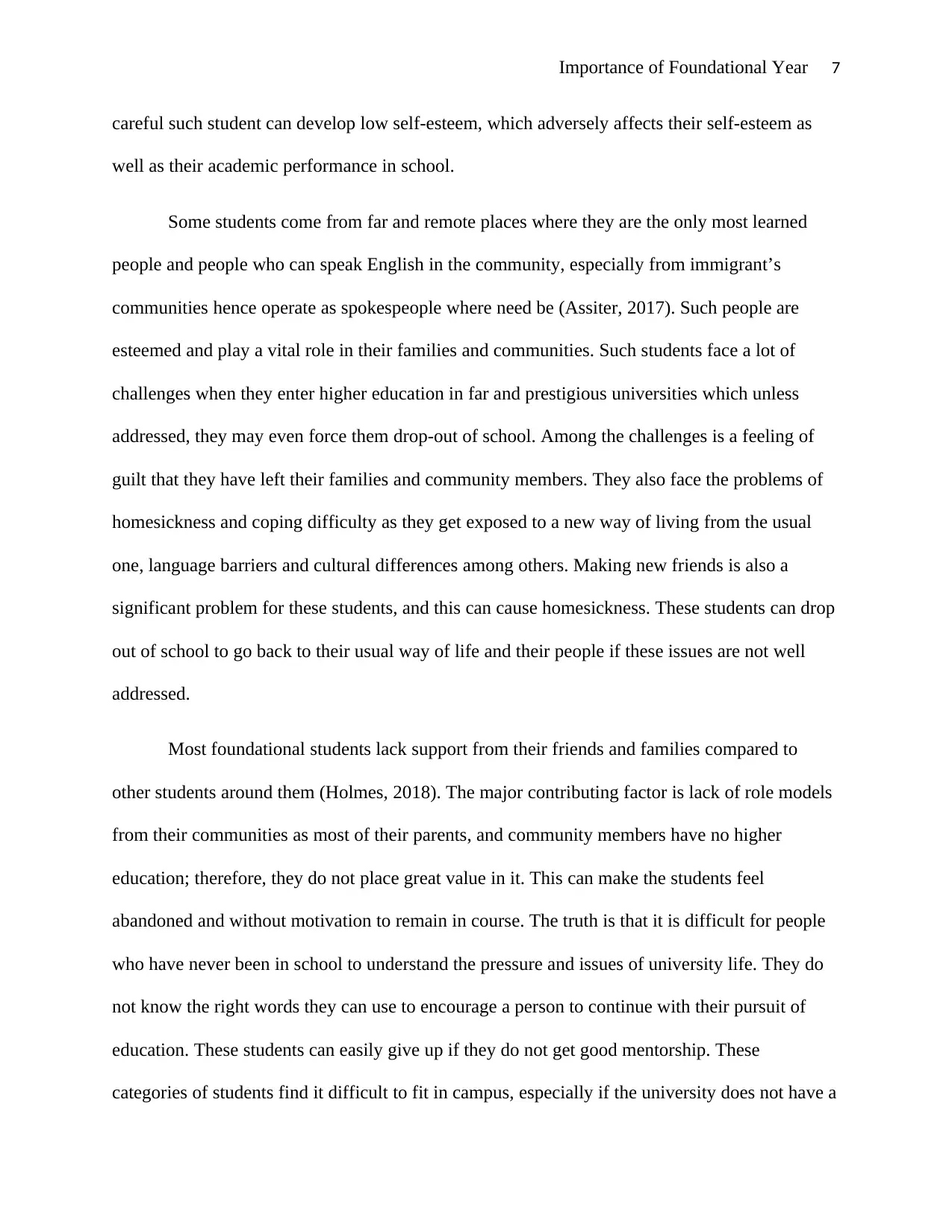
Importance of Foundational Year 7
careful such student can develop low self-esteem, which adversely affects their self-esteem as
well as their academic performance in school.
Some students come from far and remote places where they are the only most learned
people and people who can speak English in the community, especially from immigrant’s
communities hence operate as spokespeople where need be (Assiter, 2017). Such people are
esteemed and play a vital role in their families and communities. Such students face a lot of
challenges when they enter higher education in far and prestigious universities which unless
addressed, they may even force them drop-out of school. Among the challenges is a feeling of
guilt that they have left their families and community members. They also face the problems of
homesickness and coping difficulty as they get exposed to a new way of living from the usual
one, language barriers and cultural differences among others. Making new friends is also a
significant problem for these students, and this can cause homesickness. These students can drop
out of school to go back to their usual way of life and their people if these issues are not well
addressed.
Most foundational students lack support from their friends and families compared to
other students around them (Holmes, 2018). The major contributing factor is lack of role models
from their communities as most of their parents, and community members have no higher
education; therefore, they do not place great value in it. This can make the students feel
abandoned and without motivation to remain in course. The truth is that it is difficult for people
who have never been in school to understand the pressure and issues of university life. They do
not know the right words they can use to encourage a person to continue with their pursuit of
education. These students can easily give up if they do not get good mentorship. These
categories of students find it difficult to fit in campus, especially if the university does not have a
careful such student can develop low self-esteem, which adversely affects their self-esteem as
well as their academic performance in school.
Some students come from far and remote places where they are the only most learned
people and people who can speak English in the community, especially from immigrant’s
communities hence operate as spokespeople where need be (Assiter, 2017). Such people are
esteemed and play a vital role in their families and communities. Such students face a lot of
challenges when they enter higher education in far and prestigious universities which unless
addressed, they may even force them drop-out of school. Among the challenges is a feeling of
guilt that they have left their families and community members. They also face the problems of
homesickness and coping difficulty as they get exposed to a new way of living from the usual
one, language barriers and cultural differences among others. Making new friends is also a
significant problem for these students, and this can cause homesickness. These students can drop
out of school to go back to their usual way of life and their people if these issues are not well
addressed.
Most foundational students lack support from their friends and families compared to
other students around them (Holmes, 2018). The major contributing factor is lack of role models
from their communities as most of their parents, and community members have no higher
education; therefore, they do not place great value in it. This can make the students feel
abandoned and without motivation to remain in course. The truth is that it is difficult for people
who have never been in school to understand the pressure and issues of university life. They do
not know the right words they can use to encourage a person to continue with their pursuit of
education. These students can easily give up if they do not get good mentorship. These
categories of students find it difficult to fit in campus, especially if the university does not have a
Paraphrase This Document
Need a fresh take? Get an instant paraphrase of this document with our AI Paraphraser
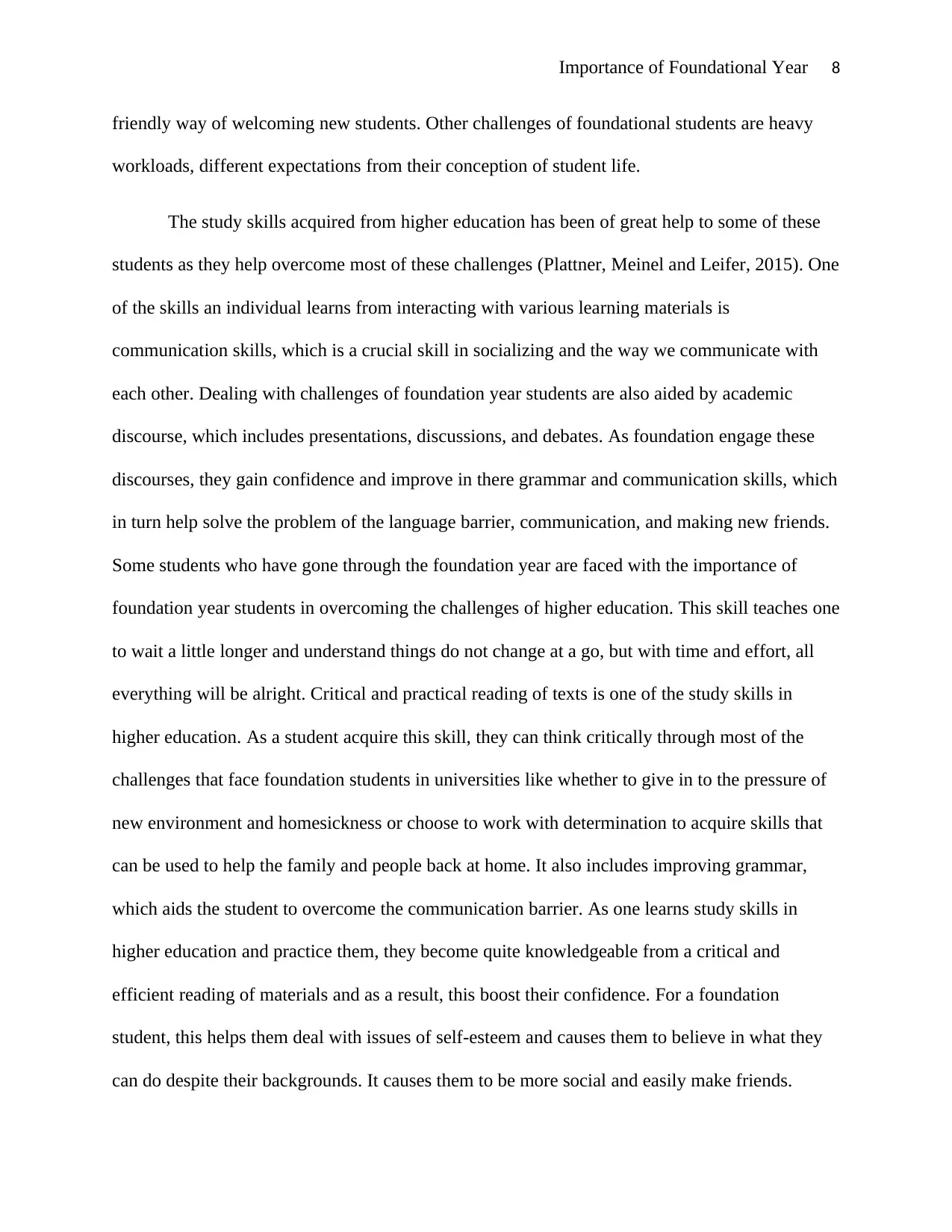
Importance of Foundational Year 8
friendly way of welcoming new students. Other challenges of foundational students are heavy
workloads, different expectations from their conception of student life.
The study skills acquired from higher education has been of great help to some of these
students as they help overcome most of these challenges (Plattner, Meinel and Leifer, 2015). One
of the skills an individual learns from interacting with various learning materials is
communication skills, which is a crucial skill in socializing and the way we communicate with
each other. Dealing with challenges of foundation year students are also aided by academic
discourse, which includes presentations, discussions, and debates. As foundation engage these
discourses, they gain confidence and improve in there grammar and communication skills, which
in turn help solve the problem of the language barrier, communication, and making new friends.
Some students who have gone through the foundation year are faced with the importance of
foundation year students in overcoming the challenges of higher education. This skill teaches one
to wait a little longer and understand things do not change at a go, but with time and effort, all
everything will be alright. Critical and practical reading of texts is one of the study skills in
higher education. As a student acquire this skill, they can think critically through most of the
challenges that face foundation students in universities like whether to give in to the pressure of
new environment and homesickness or choose to work with determination to acquire skills that
can be used to help the family and people back at home. It also includes improving grammar,
which aids the student to overcome the communication barrier. As one learns study skills in
higher education and practice them, they become quite knowledgeable from a critical and
efficient reading of materials and as a result, this boost their confidence. For a foundation
student, this helps them deal with issues of self-esteem and causes them to believe in what they
can do despite their backgrounds. It causes them to be more social and easily make friends.
friendly way of welcoming new students. Other challenges of foundational students are heavy
workloads, different expectations from their conception of student life.
The study skills acquired from higher education has been of great help to some of these
students as they help overcome most of these challenges (Plattner, Meinel and Leifer, 2015). One
of the skills an individual learns from interacting with various learning materials is
communication skills, which is a crucial skill in socializing and the way we communicate with
each other. Dealing with challenges of foundation year students are also aided by academic
discourse, which includes presentations, discussions, and debates. As foundation engage these
discourses, they gain confidence and improve in there grammar and communication skills, which
in turn help solve the problem of the language barrier, communication, and making new friends.
Some students who have gone through the foundation year are faced with the importance of
foundation year students in overcoming the challenges of higher education. This skill teaches one
to wait a little longer and understand things do not change at a go, but with time and effort, all
everything will be alright. Critical and practical reading of texts is one of the study skills in
higher education. As a student acquire this skill, they can think critically through most of the
challenges that face foundation students in universities like whether to give in to the pressure of
new environment and homesickness or choose to work with determination to acquire skills that
can be used to help the family and people back at home. It also includes improving grammar,
which aids the student to overcome the communication barrier. As one learns study skills in
higher education and practice them, they become quite knowledgeable from a critical and
efficient reading of materials and as a result, this boost their confidence. For a foundation
student, this helps them deal with issues of self-esteem and causes them to believe in what they
can do despite their backgrounds. It causes them to be more social and easily make friends.
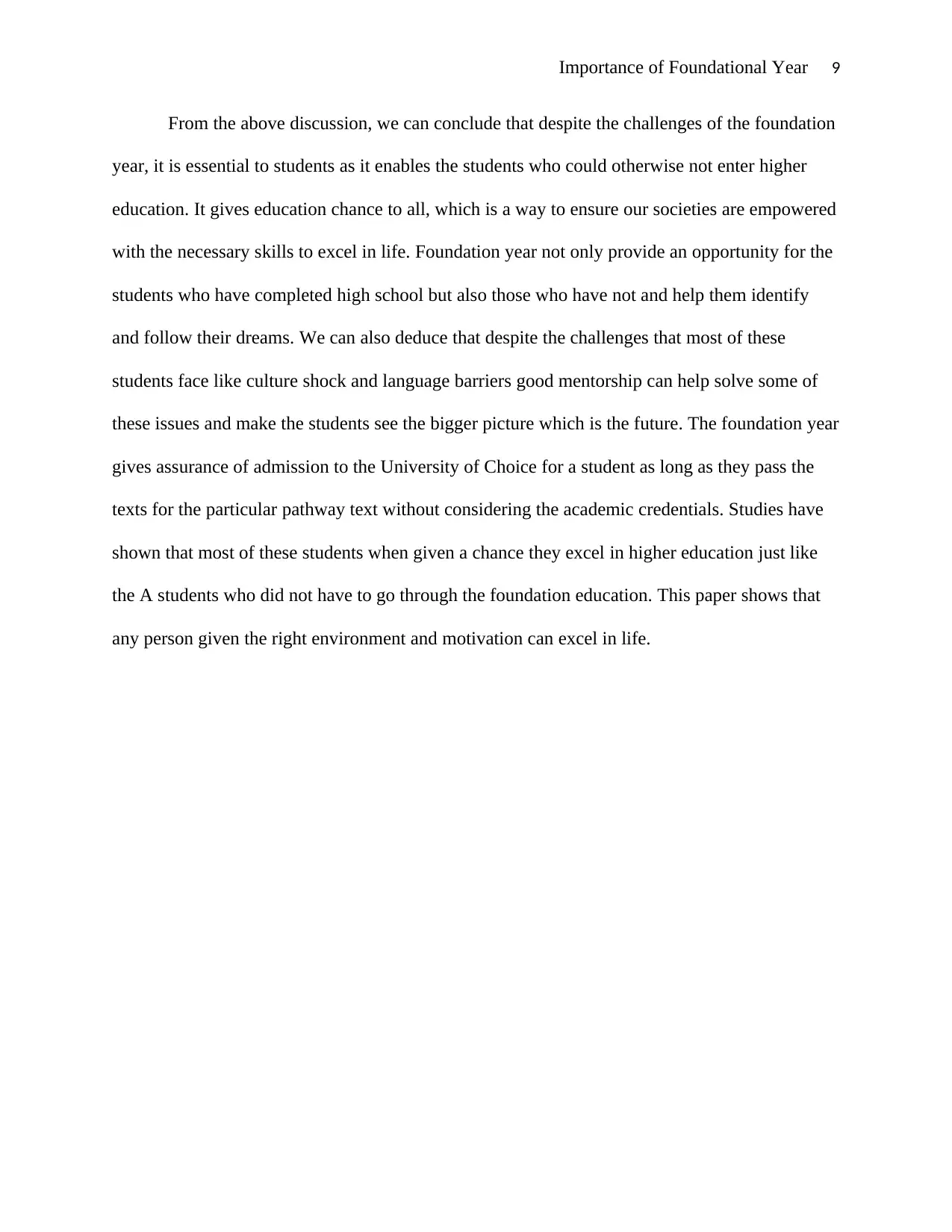
Importance of Foundational Year 9
From the above discussion, we can conclude that despite the challenges of the foundation
year, it is essential to students as it enables the students who could otherwise not enter higher
education. It gives education chance to all, which is a way to ensure our societies are empowered
with the necessary skills to excel in life. Foundation year not only provide an opportunity for the
students who have completed high school but also those who have not and help them identify
and follow their dreams. We can also deduce that despite the challenges that most of these
students face like culture shock and language barriers good mentorship can help solve some of
these issues and make the students see the bigger picture which is the future. The foundation year
gives assurance of admission to the University of Choice for a student as long as they pass the
texts for the particular pathway text without considering the academic credentials. Studies have
shown that most of these students when given a chance they excel in higher education just like
the A students who did not have to go through the foundation education. This paper shows that
any person given the right environment and motivation can excel in life.
From the above discussion, we can conclude that despite the challenges of the foundation
year, it is essential to students as it enables the students who could otherwise not enter higher
education. It gives education chance to all, which is a way to ensure our societies are empowered
with the necessary skills to excel in life. Foundation year not only provide an opportunity for the
students who have completed high school but also those who have not and help them identify
and follow their dreams. We can also deduce that despite the challenges that most of these
students face like culture shock and language barriers good mentorship can help solve some of
these issues and make the students see the bigger picture which is the future. The foundation year
gives assurance of admission to the University of Choice for a student as long as they pass the
texts for the particular pathway text without considering the academic credentials. Studies have
shown that most of these students when given a chance they excel in higher education just like
the A students who did not have to go through the foundation education. This paper shows that
any person given the right environment and motivation can excel in life.
⊘ This is a preview!⊘
Do you want full access?
Subscribe today to unlock all pages.

Trusted by 1+ million students worldwide
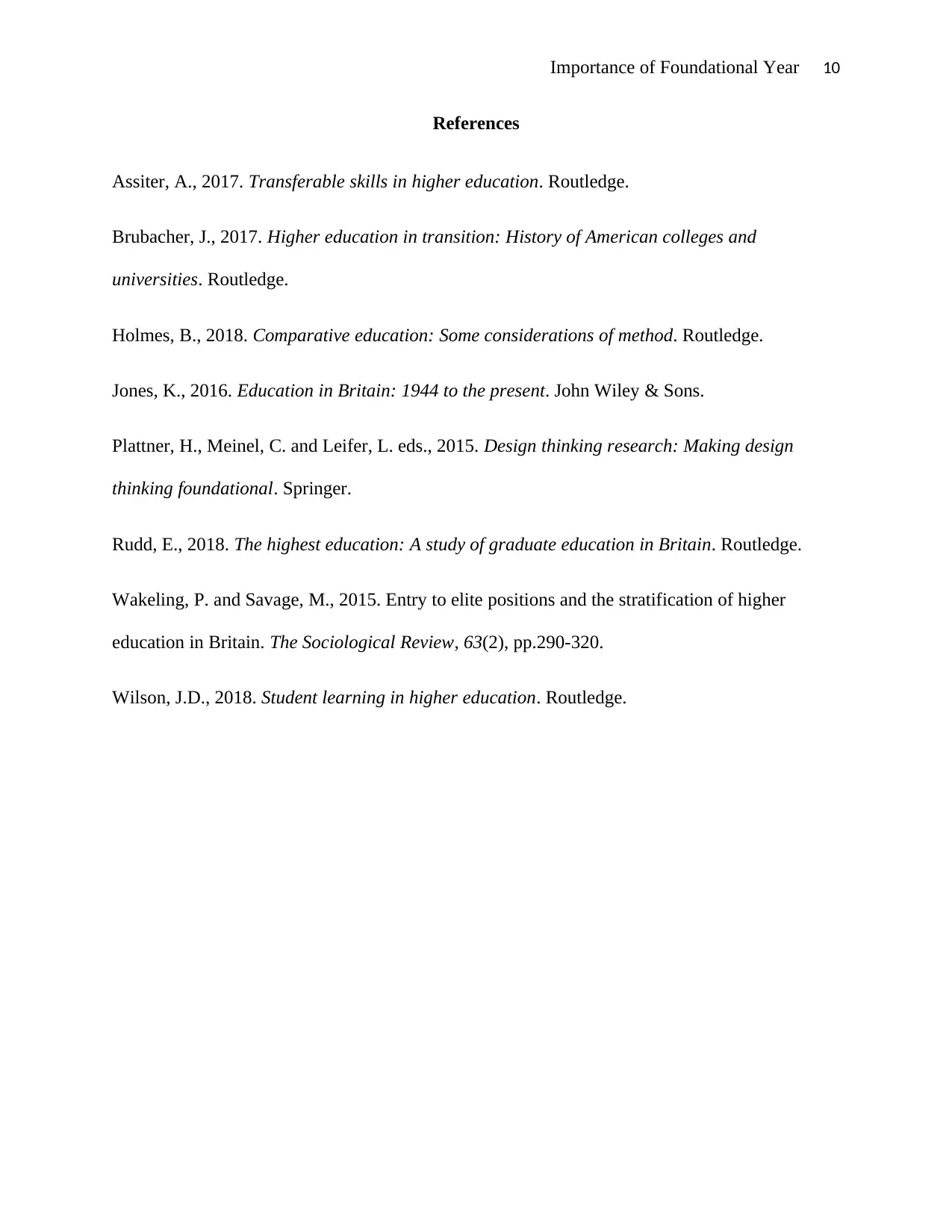
Importance of Foundational Year 10
References
Assiter, A., 2017. Transferable skills in higher education. Routledge.
Brubacher, J., 2017. Higher education in transition: History of American colleges and
universities. Routledge.
Holmes, B., 2018. Comparative education: Some considerations of method. Routledge.
Jones, K., 2016. Education in Britain: 1944 to the present. John Wiley & Sons.
Plattner, H., Meinel, C. and Leifer, L. eds., 2015. Design thinking research: Making design
thinking foundational. Springer.
Rudd, E., 2018. The highest education: A study of graduate education in Britain. Routledge.
Wakeling, P. and Savage, M., 2015. Entry to elite positions and the stratification of higher
education in Britain. The Sociological Review, 63(2), pp.290-320.
Wilson, J.D., 2018. Student learning in higher education. Routledge.
References
Assiter, A., 2017. Transferable skills in higher education. Routledge.
Brubacher, J., 2017. Higher education in transition: History of American colleges and
universities. Routledge.
Holmes, B., 2018. Comparative education: Some considerations of method. Routledge.
Jones, K., 2016. Education in Britain: 1944 to the present. John Wiley & Sons.
Plattner, H., Meinel, C. and Leifer, L. eds., 2015. Design thinking research: Making design
thinking foundational. Springer.
Rudd, E., 2018. The highest education: A study of graduate education in Britain. Routledge.
Wakeling, P. and Savage, M., 2015. Entry to elite positions and the stratification of higher
education in Britain. The Sociological Review, 63(2), pp.290-320.
Wilson, J.D., 2018. Student learning in higher education. Routledge.
1 out of 10
Related Documents
Your All-in-One AI-Powered Toolkit for Academic Success.
+13062052269
info@desklib.com
Available 24*7 on WhatsApp / Email
![[object Object]](/_next/static/media/star-bottom.7253800d.svg)
Unlock your academic potential
Copyright © 2020–2026 A2Z Services. All Rights Reserved. Developed and managed by ZUCOL.





